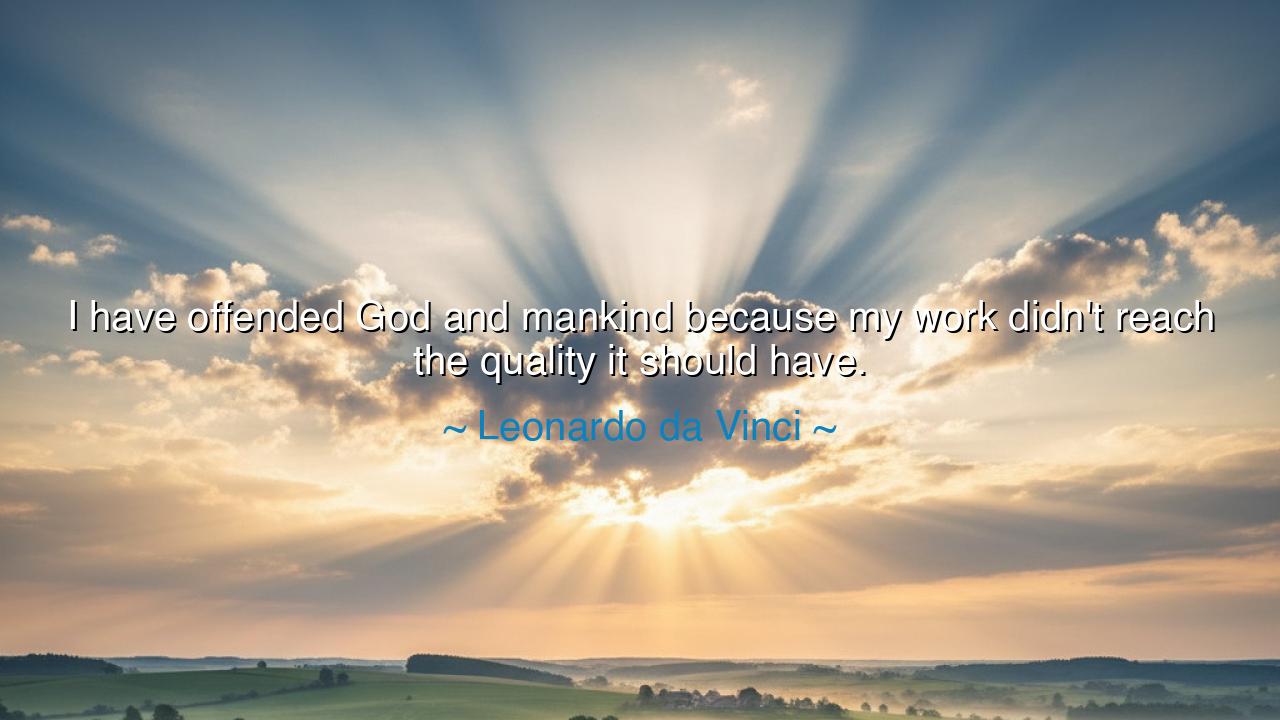
I have offended God and mankind because my work didn't reach the
I have offended God and mankind because my work didn't reach the quality it should have.






Hear now the sorrowful confession of Leonardo da Vinci, the genius of Florence, whose mind embraced the heavens and whose hands gave shape to beauty itself. Near the end of his days, he spoke these haunting words: “I have offended God and mankind because my work didn’t reach the quality it should have.” From the lips of the greatest artist of the Renaissance came not pride, but penitence—not the boast of a master, but the lament of a soul that measured itself against eternity. In this single sentence, Leonardo revealed both the heart of creation and the burden of genius: that perfection, glimpsed in the divine, can never be fully captured by mortal hands.
The origin of this quote lies in the final reflections of da Vinci’s life, a time when his body grew frail but his spirit still reached toward the infinite. After decades of painting, inventing, sculpting, and studying the mysteries of life, Leonardo looked back upon his works—The Last Supper, Mona Lisa, the sketches of flying machines—and found them wanting. To him, they were not failures of skill, but of completeness. He felt he had seen more than he could express, dreamed more than he could build, and understood more than he could teach. Thus he grieved, believing that his imperfection was an offense not only to God, the source of all perfection, but to mankind, who deserved to see that perfection reflected in his art.
In these words, Leonardo teaches us the humility of true greatness. For only those who reach the highest peaks can see how far the heavens still rise above them. The mediocre are satisfied with achievement; the truly gifted are tormented by the gap between vision and reality. Leonardo’s heart ached because he knew that creation itself is a holy act—an imitation of the divine Artist who sculpted the world from chaos. To create something unworthy of that divine standard felt to him like a wound upon the sacred order. Yet, paradoxically, it was precisely this divine dissatisfaction that made his work immortal.
Consider his “Last Supper,” that majestic fresco in Milan. The years and elements conspired to destroy it, for Leonardo had used experimental techniques that proved fragile. Even in his lifetime, the paint began to flake and fade. Yet those who saw it wept, for within its frail lines lived an eternal truth. The fragility of the painting mirrored the fragility of faith and humanity—the very tension Leonardo sought to capture. Though he called it imperfect, its imperfection became its soul. Thus his failure was his triumph, and his lament became a hymn of immortality.
Leonardo’s confession also reflects the eternal struggle of every creator, every seeker of truth. Whether one paints or writes, builds or leads, there comes a moment when one stands before one’s creation and whispers, “It is not enough.” This is not despair—it is reverence. For the artist who feels complete has ceased to grow, but the one who aches for more is still in communion with the infinite. Dissatisfaction, then, becomes the furnace of greatness, the sacred unrest that drives mankind forward in its ceaseless quest to mirror the divine.
But there is also a tenderness in his words—a reminder that even the greatest among us are frail. Leonardo, the man who sketched the anatomy of angels and dreamed of machines that would conquer the air, felt unworthy of his own visions. This humility is not weakness; it is wisdom. For he understood that the hand of man can never outshine the hand of God, and that the pursuit of perfection is not to reach it, but to honor it. To strive, even knowing one will fall short, is the truest act of devotion.
Let this, then, be the lesson passed down: Do your work as though God Himself will behold it. Pour your heart, your craft, your care into all you do, yet remember that perfection is not yours to claim. Strive, but do not despair; labor, but do not lament your limits. For in the very striving, in the trembling reach of the human spirit toward the divine, you fulfill your purpose. The unfinished becomes beautiful when born of sincere devotion.
And so, O child of creation, remember Leonardo’s sorrow and his glory. When you feel that your work is unworthy, that your dreams exceed your grasp, take heart—for that is the proof that you have touched the divine horizon. You have not offended God by imperfection; you have honored Him by striving. For the true masterpiece is not the work of your hands, but the courage of your soul that dares to reach for heaven, even while standing upon the earth.






AAdministratorAdministrator
Welcome, honored guests. Please leave a comment, we will respond soon